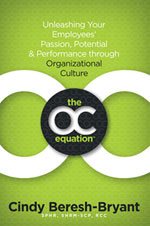The heart of your OC (Organizational Culture) is your organization’s values – and I don’t mean those nifty little captions outlined on your website, hanging nicely framed in the conference room or engraved in marble in the lobby – I mean what your organization hires, promotes, rewards and fires for. Those are your organization’s “true” values and actions speak louder than words.
A lot of companies have nice sounding values. Enron’s stated vales were: Integrity, Communication, Respect and Excellence – all widely published before their executives secretly sold off their stock bankrupting the company and causing many of their employees to lose their life savings as the company collapsed into ruin. Clearly, those stated values were not what was actually valued and rewarded at Enron.
Now before you can begin building the OC you want, you have to identify what you have. There are a number of options you can choose from to identify your current culture, including leadership interviews, employee interviews, focus groups, anonymous surveys, and even conducting a formal culture assessment. If you interview leaders, don’t stop there, it’s not uncommon for leaders to think they have one culture, when actually they have something altogether different. And that difference can only be discovered by getting multiple perspectives of what’s really valued based on what’s rewarded, promoted, and what gets someone fired.
Case in point: Recently one of our clients engaged us to help them develop a proactive culture where employees anticipate current/future events and take initiative to adapt their actions and/or to shape their results. But as we evaluated their current culture we found it was very reactive. Employees were constantly in crisis management mode jumping from one crisis to another never having time for planning or strategy development because that’s what was actually rewarded through performance reviews, merit increases, promotions, etc.
Meanwhile employees who worked quietly behind the scenes to anticipate obstacles and prevent failure were never recognized for the crises prevented or the money saved or clients protected, rather they were assumed to be only average performers with little star potential. As a result, these employees only received “average” rewards (merit increases and promotions), while their more reactive counterparts were heralded as heroes, often receiving above average merit increases, hefty promotions and BIG annual bonuses. Is it any wonder their culture was reactive?
A strong OC doesn’t happen by accident. Rather, it’s intentionally constructed with every decision made and every action taken; which ultimately establishes and reinforces your organization’s actual values and philosophies (more on philosophies next week) and is demonstrated by who gets rewarded, promoted, or let go. Click here for a real life example of the OC of an organization we all love – Costco.
Still not sure what your culture is? Check your organization’s checkbook and calendar – your culture is revealed by what your organization spends its money and time on.

